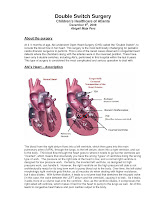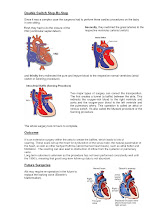I thought I would share this interesting article here as well. Seems like a great alternative to the expensive Pulse Oximeter.
I love seeing technology made useful, helpful and affordable to CHD parents and doctors.
The Electrical and Computer Engineering in Medicine (ECEM) research group in collaboration with the Pediatric Anesthesia Research Team (PART) at the University of British Columbia have developed a mobile solution to measuring key vital signs — called the “Phone Oximeter”.
The Phone Oximeter uses a traditional FDA approved pulse oximetry sensor, but researchers have modified it to interface with a phone, in this case, your iPhone. Currently the setup is being interfaced with an iPhone for trial studies, but is compatible with Android, and other mobile operating systems.
What makes the Phone Oximeter special is its ability to capture SpO2 (blood oxygen saturation), heart rate, and respiratory rate — then dynamically comprehend the variables using the decision support software, giving medical staff or even laymen individuals key help in making decisions on medical care.
So how would a device like this be useful in the medical setting?
The researchers feel the main utility of this device is for monitoring anesthesia in the developing world, where pulse oximetry can prove expensive:
Lack of training and resources, however, has limited the uptake of pulse oximetry across much of the developed world, where death rates from anesthesia remain 100 – 1,000 times higher than the developed world. Key to wider adoption of this life saving technology is the availability of affordable, robust pulse oximeters that can be used by non-specialist healthcare workers.
The primary goal of this Phone Oximeter project is to demonstrate the potential for enhanced delivery of information from a pulse oximeter to enhance the safety of anesthesia care throughout the developing world.
The research team states the overall mobile solution is cheap, and could widely be implemented in the developing world. Currently trials are being undertaken in Uganda to test the efficacy of the device.
The following is a video the research team made of the device in action. (Warning: It’s a bit over the top, leading us to let out a few chuckles)
Source: www.phoneoximeter.org
http://getbetterhealth.com/iphone-app-can-substitute-for-expensive-pulse-oximeter/2011.05.27
Art
- Posted using BlogPress from my iPad
Abigail

Tuesday, May 31, 2011
Sunday, May 22, 2011
Little artist
Abi is such a big girl and as it turns out quite an artist.
Enjoy!
J
- Posted using BlogPress from my iPhone
Enjoy!
J
- Posted using BlogPress from my iPhone
Sunday, May 15, 2011
Sunday Fun
Just coupe pictures from some of today's activities.
Great time at church in the morning, Birkdale Village and Hope Park in the late afternoon.
Abi was absolutely mesmerized by the water fountains ;-)






Art
- Posted using BlogPress from my iPad
Great time at church in the morning, Birkdale Village and Hope Park in the late afternoon.
Abi was absolutely mesmerized by the water fountains ;-)






Art
- Posted using BlogPress from my iPad
Subscribe to:
Posts (Atom)
About Abi's Blog
HELLO!!
This blog is created not only to keep our family and friends updated on Abi's condition, events, surgeries and everyday life... but also to provide legit and educated information about Congenital Heart Defects that touch 1 in 100 babies.
Welcome to Abi's blog with hopes you will find it useful, interesting, touching and even entertaining...
Here are some facts about our sweet baby girl:
Abi was born on July 24th, 2009 with several heart defects that were detected prenatally at 18 weeks: Congenitally Corrected Transposition of the Great Arteries (Congenitally Corrected Transposition of the Great Vessels) (CCTGA = LTGA = L-TGA), Ebstein's Malformation (Ebstein's Anomaly) (malformed tricuspid valve), Pulmonary Stenosis and VSD.
Her first surgery - PA band - was scheduled for December 8th, 2009, however unexpectedly was changed to an Open Heart Surgery (OHS) called Double Switch performed on December 9th, 2009, originally planned for much later...
This blog is created not only to keep our family and friends updated on Abi's condition, events, surgeries and everyday life... but also to provide legit and educated information about Congenital Heart Defects that touch 1 in 100 babies.
Welcome to Abi's blog with hopes you will find it useful, interesting, touching and even entertaining...
Here are some facts about our sweet baby girl:
Abi was born on July 24th, 2009 with several heart defects that were detected prenatally at 18 weeks: Congenitally Corrected Transposition of the Great Arteries (Congenitally Corrected Transposition of the Great Vessels) (CCTGA = LTGA = L-TGA), Ebstein's Malformation (Ebstein's Anomaly) (malformed tricuspid valve), Pulmonary Stenosis and VSD.
Her first surgery - PA band - was scheduled for December 8th, 2009, however unexpectedly was changed to an Open Heart Surgery (OHS) called Double Switch performed on December 9th, 2009, originally planned for much later...
Second OHS was scheduled for March 3rd, 2010 to correct the baffle created during the 1st surgery.
Thank you for your support and prayers.
Art & Joanna (Asia) & Abi.
Thank you for your support and prayers.
Art & Joanna (Asia) & Abi.
You can CONTACT US at: blog@Care4Abi. com
“You never know how strong you are until being strong is the only choice you have!"
Thank you for your generous heart to help cover for Abi's medical expenses...
Early and Intermediate Outcome After Anatomic Repair of CCTGA
Archives
Videos
Popular Posts
-
It's time for the big one. Congenitally Corrected Transposition of the Great Arteries (ccTGA, LTGA). In normal, healthy heart there are...
-
Alright, time for another post. For today I picked another of Abigail's heart's complexities, namely Pulmonary Stenosis (PS). There ...
-
We found out today about the upcoming surgery in Atlanta.. It's scheduled on December 8th. We're leaving on Sunday, December 6th, ...
-
Transposition of the Great Arteries (TGA) In Transpotition of the Great Arteries both, Aorta and Pulmonary Artery are transposed (inverted) ...
CHD Abbreviations:
ASD - Atrial Septal Defect;
DILV - Double Inlet Left Ventricle;
HLHS - Hypoplastic Left Heart Syndrome;
HRV - Hypoplastic Right Ventricle;
LTGA - Levo-Transposition of Great Arteries;
PA - Pulmonary Atresia;
PDA - Patent Ductus Arteriosus;
PS - Pulmonary Stenosis;
TOF - Tetralogy of Fallot
VSD - Ventricular Septal Defect
DILV - Double Inlet Left Ventricle;
HLHS - Hypoplastic Left Heart Syndrome;
HRV - Hypoplastic Right Ventricle;
LTGA - Levo-Transposition of Great Arteries;
PA - Pulmonary Atresia;
PDA - Patent Ductus Arteriosus;
PS - Pulmonary Stenosis;
TOF - Tetralogy of Fallot
VSD - Ventricular Septal Defect







